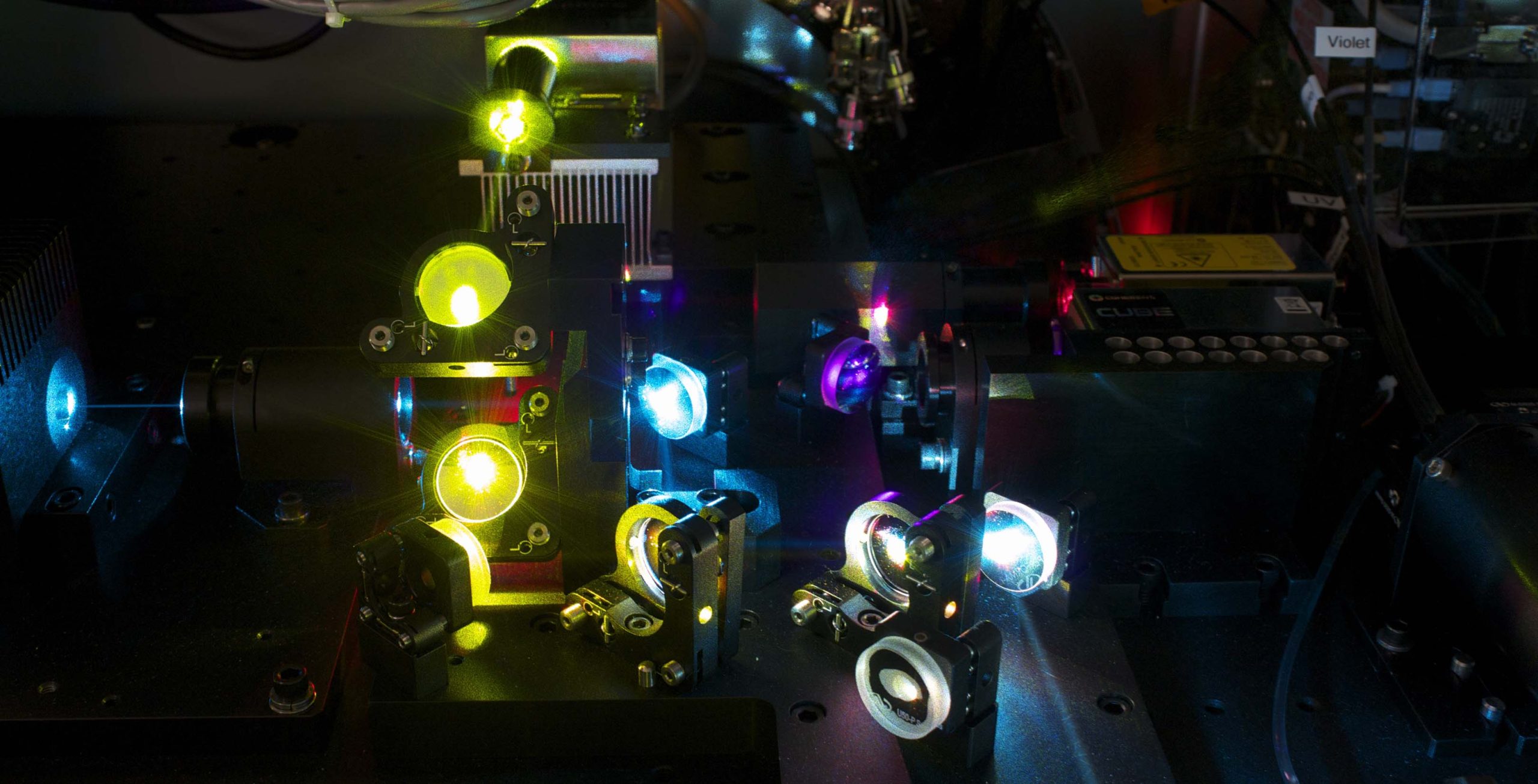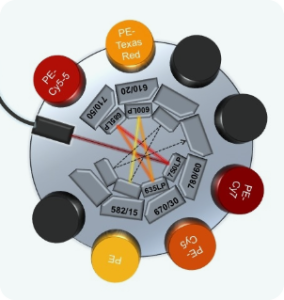Home - About - Core Facilities - Flow Cytometry

Our mission is to provide complete flow cytometry analysis and cell sorting services in terms of experimental design, instrumentation, training, technical assistance and scientific guidance.
The fee-for-service LDI Flow Cytometry Facility provides researchers and clinicians with instrumentation, scientific expertise and guidance. . It consists of three flow cytometry analyzers and two cell sorters. The Sony Biotechnology’s flagship ID7000 Spectral Cell Analyzer is our latest acquisition. It is one of the most advanced full spectrum flow cytometers on the market and it allows researchers to perform 44-colour plus assays. The facility also makes use of two conventional flow cytometers: BD LSR Fortessa and BD FACSCanto II. The FACSAria IIu and FACSAria Fusion cell sorters are available to carry out both BSL1 and BLS2 cloning and bulk cell sorting assays. Finally, the CellDrop FL cell counter (Denovix) allows accurate cell counting and cell size determination. . Several flow cytometry data analysis stations are available.
With an array of lasers, prisms, mirrors and filters, flow cytometry instruments enable us to look at several physical and fluorescent parameters of a single cell. These physical and fluorescent parameters are analyzed simultaneously, and since flow cytometers can analyze tens of thousands of cells per second, large populations of cells can easily be quantitatively characterized at single cell resolution. It is this multiplexing capability that makes flow cytometry an extremely versatile and powerful tool for both researchers and clinicians. In addition, fluorescence activated cell sorters can physically separate these populations in different vessels or deposit single cells into a multi-well plate for cloning.

Flow cytometry (FCM) is a versatile technology, which allows for quantification of fluorescence and structural features of particles (most commonly cells). FCM analyzers provide rapid quantitative analysis of particles in suspension or soluble proteins from serum, fractioned cells, trypsinized cells or dissociated tissue. Researchers and clinicians can obtain several statistics on a single cell and population level. Cell sorters can also analyze particles and, in addition, can physically separate cells of interest at high purity for downstream assays. A non-exhaustive list of different flow cytometry assays is listed below.
The advantage of using FCM is that it is an extremely fast procedure and a relatively small quantity of sample is needed. Sample processing, acquisition, analysis and data reporting can be performed in just one day. Furthermore, in multiparameter FCM, several fluorescent parameters or colors are analyzed simultaneously. We can for example identify the phenotype and ascertain viability, vitality, proliferative capacity and cell cycle state of each cell. Therefore, since millions of cells can be quickly analyzed, we can identify extremely rare cell populations and also obtain population statistics with greater accuracy.
Sensitive digital high-speed cell sorter
Flow cytometry cell sorting
Detect 20 parameters; 18 colours
4-way bulk cell sorting
Single cell sorting for cloning
BSL I and BLS II samples
Interchangeable nozzle
Interchangeable emission filters
Adjustable sheath pressure
Facility staff only
Contact LDI Flow Cytometry Facility staff
Complete LDI Cell Sorting Request Form
Full spectrum flow cytometer
Flow cytometry analysis
24 tube rack HTS
96/384-well plate HTS
Detects 184 parameters; 182 colors
Spectral detection from 360nm to 844nm
Analysis of virtually any fluorophore
BSL I samples
BSL II samples, please inquire
Spectral analysis
Virtual filter
Technical assistance by facility staff
Trained users
LDI Core Booking Calendar
Sensitive digital flow cytometer
equipped with a High Throughput Sampler
(HTS)
Flow cytometry analysis
96-well plate HTS
Detects 20 parameters; 18 colors
BSL I samples
Interchangeable emission filters
Technical assistance by facility staff
Trained users
LDI Core Booking Calendar
Digital clinical grade flow cytometer
Flow cytometry analysis
Detects 8 parameters; 6 colors
BSL I samples
Interchangeable emission filters
Technical assistance by facility staff
Trained users
LDI Core Booking Calendar
Fluorescent Cell counter
Automated live/dead cell counting using trypan blue or adridine orange/propidium iodide
Calculates cell diameter
BSL I samples direct pipetting
BSL II samples using disposable slides
None
Trained users
No booking required, first come
first serve
The cell sorting room, E-417.1, is a Containment Level 2 (CL2) Laboratory. Users must submit the Cell Sorting Request form and, if applicable, disclose any risk factors by completing the High Risk Cell Sorting form at time of booking.
Flow Cytometry Services | Minimum Time Charged (min) | Internal McGill | External Academic | External Commercial |
Sony ID7000 Full Spectrum Analyser | 15 | 35.00 | 85.00 | 100.00 |
BD LSR Fortessa HTS Analyser | 15 | 30.00 | 65.00 | 80.00 |
BD FACSCanto II Analyser | 15 | 30.00 | 65.00 | 80.00 |
BD FACSAria Fusion – Cell Sorting | 60 | 80.00 | 100.00 | 200.00 |
Denovic CellDrop Cell Counter | N/A | Free | Free | N/A |
Analyser Technical Assistance (Additional) | 60 | 35.00 | 65.00 | 100.00 |
Analyser Training (Additional) | 60 | 35.00 | 65.00 | 100.00 |
Data Analysis/Consultation | 60 | 35.00 | 65.00 | 100.00 |
The LDI core facilities uses the LDI Core Scheduler accessible through the web
The FACSAria Fusion cell sorter is operated by a core facility staff. To schedule a cell sorting experiment please follow these instructions.
LDI Students and Staff:
Please login to our LDI Core Scheduling system and book the FACSAria Fusion instrument
Fill and send the Cell Sorting Request form and the High Risk Cell Sorting form if required.
Your booking will be approved if an operator is available and form(s) received.
External Users:
Please contact the LDI Flow Cytometry Facility to make an appointment.
Trained users can operate the ID7000, LSR Fortessa, FACSCanto II and CellDrop FL Cell Counter unassisted 24/7 at the LDI Flow Cytometry Facility. To request an instrument training session, please contact the core facility by email and fill out a User Information Form.
A highly qualified LDI Flow Cytometry Facility staff can acquire and analyze your flow cytometry experiments. Please contact us to make an appointment. We will access the feasibility of your experiment and schedule your run.
Lady Davis Institute for Medical Research, Rm E-415
Jewish General Hospital
3999 Côte Ste-Catherine Road
Montreal, Qc
H3T 1E2